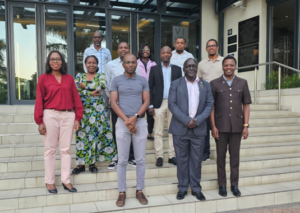 The African Society for Laboratory Medicine (ASLM), in collaboration with Mozambique’s Ministry of Health, held a workshop from 20-22 May, 2024, in Maputo, Mozambique, aimed at enhancing the country’s laboratory systems. The primary objective was to review and refine the Laboratory Mapping Program (LabMaP) dataset collected in January 2024, equipping participants with the skills to analyze data, derive strategic insights, and propose short, medium, and long-term improvements for the national laboratory systems.
The African Society for Laboratory Medicine (ASLM), in collaboration with Mozambique’s Ministry of Health, held a workshop from 20-22 May, 2024, in Maputo, Mozambique, aimed at enhancing the country’s laboratory systems. The primary objective was to review and refine the Laboratory Mapping Program (LabMaP) dataset collected in January 2024, equipping participants with the skills to analyze data, derive strategic insights, and propose short, medium, and long-term improvements for the national laboratory systems.
Supported by ASLM and the Global Fund, participants from the laboratory directorate of the ministry of health and various partners engaged in comprehensive discussions to validate and clean the LabMaP dataset. This process led to significant insights and recommendations for improving laboratory systems and networks in Mozambique. The workshop was jointly funded by GIZ and the Global Fund.
Participants, who had previously undergone training, applied their knowledge using Planwise, an application for population accessibility analysis and network optimization. The team focused on optimizing tuberculosis (TB) test coverage using the GeneXpert platform in Mozambique, exploring multiple options through Planwise.
Key stakeholders, including leadership from the ministry of health’s laboratory directorate, the monitoring and evaluation team, and representatives from the University of Maryland, attended the three-day workshop. Central to the discussions was laboratory mapping, a collaborative initiative between Africa CDC and ASLM. This effort aims to map existing laboratory capacities across the continent, addressing priorities of Africa CDC and other international health bodies.
 Stakeholders tackled crucial questions about the geographical distribution of laboratories, capacities such as test menus, workforce, quality management systems, biosafety and biosecurity, supply chain, and gaps in population access to laboratory services. The goal was to utilize data for strategic planning and investments, aligning with the Regional Integrated Surveillance and Laboratory Network (RISLNET) initiative.
Stakeholders tackled crucial questions about the geographical distribution of laboratories, capacities such as test menus, workforce, quality management systems, biosafety and biosecurity, supply chain, and gaps in population access to laboratory services. The goal was to utilize data for strategic planning and investments, aligning with the Regional Integrated Surveillance and Laboratory Network (RISLNET) initiative.
The workshop’s notable outcomes included the validation and adoption of a final laboratory mapping dataset, laying the foundation for informed decision-making. Scenarios were developed to support TB test laboratory network optimization, key gaps were identified using the data, and actionable recommendations were made to enhance Mozambique’s laboratory systems and networks

